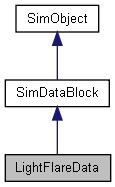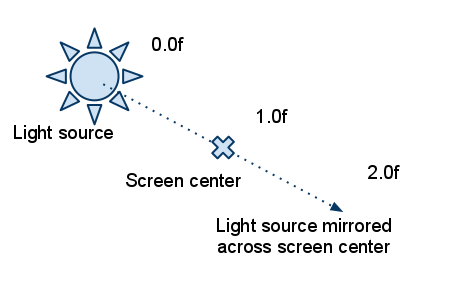

|
|
|
Defines a light flare effect usable by scene lights. More...

Public Member Functions | |
| void | apply () |
| Intended as a helper to developers and editor scripts. | |
Public Attributes | |
FlareElements | |
| float | elementDist [20] |
| Where this element appears along the flare beam. | |
| RectF | elementRect [20] |
| A rectangle specified in pixels of the flareTexture image. | |
| bool | elementRotate [20] |
| Defines if this element orients to point along the flare beam or if it is always upright. | |
| float | elementScale [20] |
| Size scale applied to this element. | |
| ColorF | elementTint [20] |
| Used to modulate this element's color if elementUseLightColor is false. | |
| bool | elementUseLightColor [20] |
| If true this element's color is modulated by the light color. If false, elementTint will be used. | |
| bool | flareEnabled |
| Allows the user to disable this flare globally for any lights referencing it. | |
| filename | flareTexture |
| The texture / sprite sheet for this flare. | |
LightFlareData | |
| float | occlusionRadius |
| If positive an occlusion query is used to test flare visibility, else it uses simple raycasts. | |
| float | overallScale |
| Size scale applied to all elements of the flare. | |
| bool | renderReflectPass |
| If false the flare does not render in reflections, else only non-zero distance elements are rendered. | |
Defines a light flare effect usable by scene lights.
LightFlareData is a datablock which defines a type of flare effect. This may then be referenced by other classes which support the rendering of a flare: Sun, ScatterSky, LightBase.
A flare contains one or more elements defined in the element* named fields of LightFlareData, with a maximum of ten elements. Each element is rendered as a 2D sprite in screenspace.
// example from Full Template, core/art/datablocks/lights.cs datablock LightFlareData( LightFlareExample0 ) { overallScale = 2.0; flareEnabled = true; renderReflectPass = true; flareTexture = "./../special/lensFlareSheet1"; occlusionRadius = 0.25; elementRect[0] = "0 512 512 512"; elementDist[0] = 0.0; elementScale[0] = 0.5; elementTint[0] = "1.0 1.0 1.0"; elementRotate[0] = false; elementUseLightColor[0] = false; elementRect[1] = "512 0 512 512"; elementDist[1] = 0.0; elementScale[1] = 2.0; elementTint[1] = "0.5 0.5 0.5"; elementRotate[1] = false; elementUseLightColor[1] = false; };
The elementDist field defines where along the flare's beam the element appears. A distance of 0.0 is directly over the light source, a distance of 1.0 is at the screen center, and a distance of 2.0 is at the position of the light source mirrored across the screen center.

| void LightFlareData::apply | ( | ) |
Intended as a helper to developers and editor scripts.
Force trigger an inspectPostApply
| float LightFlareData::elementDist[20] |
Where this element appears along the flare beam.
| RectF LightFlareData::elementRect[20] |
A rectangle specified in pixels of the flareTexture image.
| bool LightFlareData::elementRotate[20] |
Defines if this element orients to point along the flare beam or if it is always upright.
| float LightFlareData::elementScale[20] |
Size scale applied to this element.
| ColorF LightFlareData::elementTint[20] |
Used to modulate this element's color if elementUseLightColor is false.
| bool LightFlareData::elementUseLightColor[20] |
If true this element's color is modulated by the light color. If false, elementTint will be used.
Allows the user to disable this flare globally for any lights referencing it.
| filename LightFlareData::flareTexture |
The texture / sprite sheet for this flare.
If positive an occlusion query is used to test flare visibility, else it uses simple raycasts.
Size scale applied to all elements of the flare.
If false the flare does not render in reflections, else only non-zero distance elements are rendered.